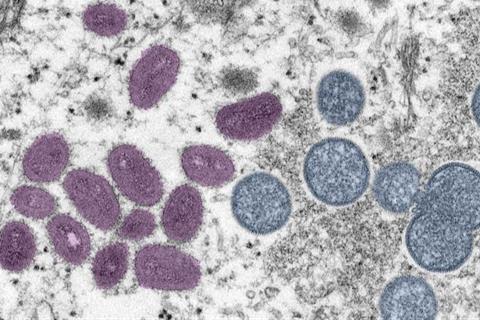A clinical trial to evaluate the antiviral drug tecovirimat, also known as TPOXX, in adults and children with monkeypox has begun in the Democratic Republic of the Congo (DRC).
The trial will evaluate the drug’s safety and its ability to mitigate monkeypox symptoms and prevent serious outcomes, including death.

The National Institute of Allergy and Infectious Diseases (NIAID), part of the US National Institutes of Health, and the DRC’s National Institute for Biomedical Research (INRB) are co-leading the trial as part of the government-to-government PALM partnership.
Collaborating institutions include the US Centers for Disease Control and Prevention (CDC), the Institute of Tropical Medicine Antwerp, the aid organization Alliance for International Medical Action (ALIMA) and the World Health Organization (WHO).
TPOXX, made by the pharmaceutical company SIGA Technologies, Inc. (New York), is approved by the US Food and Drug Administration for the treatment of smallpox. The drug impedes the spread of virus in the body by preventing virus particles from exiting human cells. The drug targets a protein that is found on both the virus that causes smallpox and the monkeypox virus.
“Monkeypox has caused a high burden of disease and death in children and adults in the Democratic Republic of the Congo, and improved treatment options are urgently needed,” said NIAID Director Anthony S. Fauci, M.D.
“This clinical trial will yield critical information about the safety and efficacy of tecovirimat for monkeypox. I want to thank our DRC scientific partners as well as the Congolese people for their continued collaboration in advancing this important clinical research.”
Since the 1970s, monkeypox virus has caused sporadic cases and outbreaks, primarily in the rainforest areas of central Africa, and in west Africa. A multi-continent outbreak of monkeypox in areas where the disease is not endemic, including Europe and the United States, has been ongoing since May 2022 with the majority of cases occurring in men who have sex with men.
The outbreak has prompted recent public health emergency declarations from the WHO and the U.S. Department of Health and Human Services. From Jan 1 2022 to Oct. 5, 2022, the WHO has reported 68,900 confirmed cases and 25 deaths from 106 countries, areas and territories.
According to the WHO, cases identified as part of the ongoing global outbreak are largely caused by monkeypox virus Clade IIb. Clade I, which is estimated to cause more severe disease and higher mortality than Clade IIa and Clade IIb, especially in children, is responsible for infections in the DRC.
People can become infected with monkeypox through contact with infected animals, such as rodents, or nonhuman primates or humans. The virus can transmit among humans by direct contact with skin lesions, body fluids, and respiratory droplets, including through intimate and sexual contact; and by indirect contact with contaminated clothing or bedding. Monkeypox can cause flu-like symptoms and painful skin lesions. Complications can include dehydration, bacterial infections, pneumonia, brain inflammation, sepsis, eye infections and death.
The trial will enroll up to 450 adults and children with laboratory-confirmed monkeypox infection who weigh at least 3 kilograms (kg). Pregnant women are also eligible to enroll. The volunteer participants will be assigned at random to receive either oral tecovirimat or placebo capsules twice daily for 14 days, with the dose administered dependent on the participant’s weight. The trial is double-blinded, so participants and investigators do not know who will receive tecovirimat or placebo.
The study is primarily designed to compare the average time to healed skin lesions among those receiving tecovirimat versus those receiving placebo. Investigators will also gather data on multiple secondary objectives, including comparisons of how quickly participants test negative for monkeypox virus in the blood, overall severity and duration of disease, and mortality between groups.
The trial is led by co-principal investigators Jean-Jacques Muyembe-Tamfum, MD, PhD, director-general of INRB and professor of microbiology at Kinshasa University Medical School in Gombe, Kinshasa; and Placide Mbala, MD, PhD, operations manager of the PALM project and head of the Epidemiology Department and the Pathogen Genomic Laboratory at INRB.







No comments yet